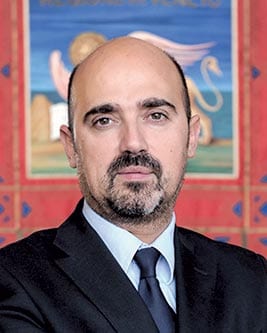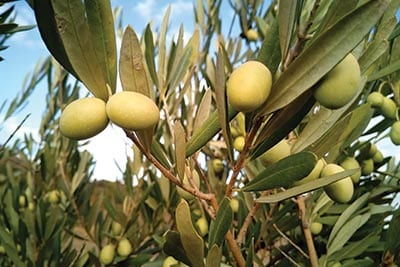Italian investments in the field of agriculture have excellent results, while our trade in this sector is reaching new heights. With my visit to Serbia, the Italian Government wants to send a strong message of support to the development of our two countries’ bilateral relations in the field of agriculture and agribusiness
From 11th to 17th May, the International Agricultural Fair in Novi Sad will be honoured to have Italy as an official country partner for the 2nd time. This is just one of many signs of the commitment of both Italy and Serbia to work hard to explore new avenues of cooperation in the agriculture sector. The visit of Franco Manzato, Undersecretary for Agriculture at the Italian Ministry of Agriculture, Food and Forestry, represents yet another sign of the excellent bilateral relations between Italy and Serbia, during a year in which we are celebrating 140 years of diplomatic relations between the two countries and 10 years of their strategic partnership.
What are the main goals of your visit to Serbia?
– With my visit to Serbia, the Italian Government wants to send a strong message of support to the development of our two countries’ bilateral relations in the field of agriculture and agribusiness. Italy is extremely proud to be the Partner Country of this year’s Novi Sad International Agriculture Fair, and I am personally glad to be able to participate to the inauguration day, together with the Serbian authorities. It is very important for us to show Italian companies that we value their work on the Southeast European market and that we support the development of strong collaborations with business partners from Serbia and the entire Balkan region.
How important is the field of agriculture in Italian-Serbian relations?
– Agriculture and agribusiness generally represent an essential part of our economies. Italy’s agri-food sector as a whole is worth more than 130 billion euros, or 11% of our GDP, while at the same time agriculture’s contribution to Serbia’s GDP remains high.
Of course, this is fully reflected in bilateral trade between our two Countries. Serbian agricultural exports to Italy increased by more than 25% in 2018, while Italian export to Serbia rose by almost 4%. Statistics for last year describe a huge intensification in our exchanges, but also – more importantly – show huge potential for further growth. I am sure that our presence at the Novi Sad fair, both institutionally and commercially, will help advance our recent achievements.
This year sees Italy as the ‘Country Partner’ of the International Agricultural Fair in Novi Sad for the 2nd time, while this event will also mark the 7th collective exhibition of food producers and companies involved in food production. What is the main message you’d like to send to Italian and Serbian partners?
– Italy’s participation as Partner Country of the International Agricultural Fair represents one of the first follow-ups to Prime Minister Giuseppe Conte’s visit to Belgrade last March. We are also this year celebrating 140 years of diplomatic relations and 10 years of the strategic partnership between Italy and Serbia, which is why we want to honour the Italian-Serbian friendship in every possible field – from culture to trade, science to industry, tourism to agriculture…
We want to show Italian companies that we value their work on the SEE market and that we support the development of strong collaborations with businesses from Serbia and the entire Balkan region
As you rightly point out, we have had a national pavilion for seven consecutive years, thanks to the incredible work of the Italian Trade Agency ICE and the Italian Embassy in Belgrade. This year we are happy to host 27 companies at “Padiglione Italia”, together with representatives of the Veneto Region and Verona’s Fair. We are also organising four seminars during the course of the week, dedicated to new technologies, green and circular economies, hazelnut production and agricultural machinery.
In which areas of cooperation do you see the greatest potential to advance our cooperation? Is it in mutual trade or Italian investments in the food sector in Serbia?
 – I do believe that trade and direct investments go hand in hand; you can’t have one without the other. Italy has always been present in Serbia, and Italian companies have invested in the local agricultural sector with excellent results. We would be more than happy to increase the presence of Serbian investors in Italy as well, because we truly believe that economic growth can only be achieved if we integrate our value chains and promote free trade within a common European market.
– I do believe that trade and direct investments go hand in hand; you can’t have one without the other. Italy has always been present in Serbia, and Italian companies have invested in the local agricultural sector with excellent results. We would be more than happy to increase the presence of Serbian investors in Italy as well, because we truly believe that economic growth can only be achieved if we integrate our value chains and promote free trade within a common European market.
This does not mean that we do not want to promote our “Made in Italy” brand or that you should not develop a stronger “Made in Serbia” label, quite the contrary. The uniqueness of our territories and products should be valued. Italian and Serbian citizens should be able to enjoy high quality products. But we should work together to protect our producers and consumers, exchange experiences and technologies, and to reinforce a common legislative framework.
Considering the strength and high quality of Italian food products, is there at all a niche market for products coming from the developing countries such as Serbia?
– In my opinion, the future of the entire European food production – and this is true also for Serbia, which I would not consider as being a developing country in this respect – lies in high quality and organic production. If we think about geography and the history of our agriculture, we can’t consider our products as pure commodities. We have to use new technologies to revive our traditional products, but also adopt European and international laws in order to protect those same products on the global market. Italy has a clear vision regarding all of that, and we are ready to share our experience with our partners – starting from EU candidate countries like Serbia.
Italy supports Serbia’s efforts to join the EU and the harmonisation of Serbia’s legal framework with the EU acquis. How satisfied are you with Serbia’s progress through the several twinning projects established in agriculture?
– Italy stands close to Serbia on its path towards the EU, at both the political and technical levels, and twinning projects are definitely a useful instrument for facilitating accession processes. We are very satisfied with the cooperation between our countries’ ministries of agriculture: Italian and Serbian experts have worked together on four twinning projects in the last six years. The EU accession process represents a great opportunity to raise the standards of Serbian legislation, thereby having a direct impact on the well-being of citizens. Serbia has shown a great deal of progress in the agricultural sector, and Italy is supporting the advancement of negotiations in this field in Brussels.
Last year saw the ministries of agriculture of Italy and Serbia sign a Memorandum of Understanding in the phyto-sanitary field. What was the importance of this document, and in which areas do you envisage further institutional cooperation?
– We recently concluded activities on the twinning project aimed at “strengthening the capacities of the phytosanitary sector in the field of registering plant varieties, including improvement in variety testing authorities”.
Within this framework, our ministries of agriculture signed the Memorandum to which you are referring. Today we can state with pride that, thanks to the strong institutional will of both Serbia and Italy, agricultural experts from our two Countries – particularly phyto-sanitary inspectors – are in direct contact and can trust each other’s work.
I am pretty sure that your honey from Fruška Gora, your cheese from Pirot and your raspberries from Arilje will very soon be world famous, allowing your local producers to prosper
We will, of course, continue to work together on many other issues, such as rural development, while another twinning project is still ongoing and deals with “the legislative framework in the field of organic production and food quality policy”.
The Italian Government’s programme pledges to “protect the highest-quality Made in Italy products”. What role does technology play in maintaining food quality today?
– I do believe that technology is the key to thriving in the near future, especially for small producers.

The ‘Agriculture 4.0’ concept is finally taking off and we should apply it to every aspect of our work, from production to transformation, and from distribution to consumption. Italian scientists from our main national research centre (Centro Nazionale Ricerche – CNR) will participate in the International Agriculture Fair in Novi Sad, in order to share the results of their studies in the field of food sciences, biology and green chemistry with farmers and food business operators. Technologies and knowledge stemming from high-level research institutions can be applied directly by Italian and Serbian producers. Tradition and innovation should not be seen as opposites – they can actually represent two sides of the same coin.
Of the European Union’s 28 member states, Italy has the most food products with PDO (Protected Designation of Origin) and PGI (Protected Geographical Indication) labels. What challenges are posed by e-commerce when it comes to international food counterfeiting?
– Italy is very proud of this record. We have 299 registered PDO and PGI food products, plus all the wines and spirits! This is a huge number that allows us not only to protect our farmers and artisans but also to boost our exports. It is paramount for us to be able to be present in international markets with recognisable brands that are synonymous with safe and high-quality food. That’s why the Italian Ministry of Agriculture is actively promoting the fight against food counterfeiting. We recently signed important agreements with Amazon, eBay and AliBaba – three of the world’s biggest e-commerce platforms. We are also very strict when it comes to reporting so-called “Italian sounding” cases, with our Inspectorate for fraud repression and quality protection of the agri-food products having carried out 54,098 anti-fraud controls in 2018.
How resilient are food exports to the recent interruptions in global trade flows?
– As previously stated, we should not aim to produce commodities, but rather high-quality products. Commodities are more exposed to external shocks and obstacles to global trade, while high-end food products tend to have stable demand among international consumers. Prosciutto di Parma, Prosecco, Chianti and Gorgonzola can only come from Italy, which is why they are so appreciated all over the world. I am pretty sure that your honey from Fruška Gora, your cheese from Pirot and your raspberries from Arilje will very soon be world-famous, allowing your local producers to prosper.